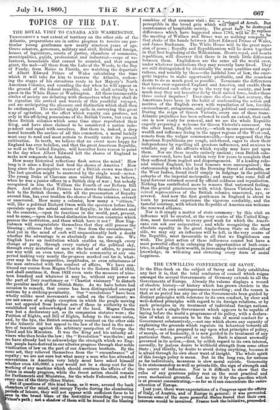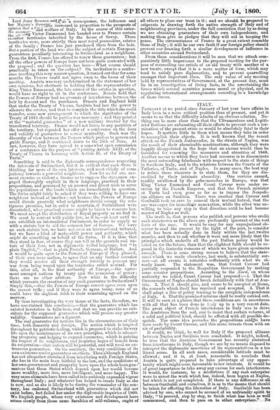THE UNWILLING CONFERENCE ON SAVOY.
IF the Blue-book on the subject of Savoy and Italy establishes
any fact it is, that the total confusion of council which reigns amongst the several Governments of Germany extends to all the Governments of Europe. Already the volume displays a record of obsolete history—of history which has grown obsolete in the very act of its own contemporaneous recording ; and the reason is that at no period has any one of the Governments been guided by distinct principles with reference to its own conduct, by clear and well-defined principles with regard to its foreign relations, or by such principles in its treatment of individual foreign nations. There is not a single Government which appears to be capable of laying before the world a programme of its policy, with a declara- tion of what it accounts to be the rule of moral conduct for a Government substantively,—not one which shows any capacity of explaining the grounds which regulate its behaviour towards all the rest,—not one prepared to say upon what principles of policy, of morals, or of humanity it is now guided in its treatment of any particular State, powerful. or feeble. Faith is almost avowedly governed in its action,—first, by selfish regard to its own interest, secondly, by jealous desire to withhold strength from some other State ; and thirdly, by desire to avoid doing anything, because it is afraid through its own sheer want of insight. The whole spirit of this foreign policy is mean. But, in the long run, for nations as for individuals, meanness is slow moral suicide. Generosity is in statesmanship as well as private life, the sign of strength and
the source of influence. Nor is it difficult to show that the rules of any generous policy rest on the most practical and even mechanical gronnds, Let us try it by the question which is at present concentrating,-,-so far as it Call ooneentrate the entire attention of Europe. Last year, there were expectations of' & Congress upon the affairs of Italy, of Austria and of Europe in general; it was prevented because some of the more powerful States feared that their own interests would be involved. France took the initiative, proceeded. Lord Rem Rosszte saidta's it consequence, the influence and her Majesty's GoverNe increased in proportion to the prospects of opinion that a and welfare of Italy. In the course of this enter- No summer-- n the „q.—ng Victor Emmanuel has handed over to France certain thoutier territories inherited by the house of Savoy. Those territories were, more strictly than most royal possessions, estates of the family ; France has just purchased them from the heir. But a portion of the land was also the subject of certain European guarantees peculiarly interesting to Switzerland as a neighbour. From the first, France has offered to renew those guarantees ; but all the other powers of Europe have not been quite contented with the proposal; and the question has been—What course should practically be taken on the subject? On invitation to a confer- ence touching this very narrow question, it turned out that for some months the Powers could not agree even to the bases of their meeting. Austria was very undetermined in the statement of her own opinions, but obstinate in holding that the representative of King Victor Emmanuel, the late owner of the estates in question, would have no right to sit in the conference. Russia held that the Powers of Europe had no grounds of interfeience between the heir by descent and the purchaser. Prussia and England held that under the Treaty of Vienna, Sardinia had lost the power to alienate the estates, and that to complete the title which she could transfer, some new arrangement to which the signitaries of the Treaty of 1815 should be parties was necessary ; and they pointed at the "material guarantee" of a new military frontier for the transferred territory. Fiance would not listen to any partition of the territory, but repeated her offer of a conference on the form and validity of guarantees to secure neutrality. Such was the diversity of view between the Powers which profess to govern and guide Europe, and it continued down to the 25th of June. At last, however, they have agreed to a somewhat open commission of a conference for the purpose of "putting Article XCII. of the Treaty of Vienna in harmony with Aiticle II. of the Treaty of Turin."
Something is said in the diplomatic correspondence respecting the interests of Switzerland, but it is evident that each State is thinking far more of its own interests, and most chiefly of some jealousy towards a powerful neighbour. Now let us for one =- meat exercise so violent a licence as to suppose the statesmen en- gaged thoroughly explicit in their language, practical in their propositions, and governed by an avowed and direct wish to serve the populations of the lands which are immediately in question. The Swiss might fairly be asked if they were willing to have one neighbour instead of another ; not because the Powers of Europe could dictate precisely what neighbours should occupy the con- tiguous premises, but in order to ascertain, if Switzerland were dissatisfied, what practical course might be taken to reassure her. We must accept the distribution of Royal property as we find it. We must be content with public law, as it is,—at least until we can establish an international Parliament, in order to supply us with a statute law to aid the common law of Europe. We have no such statute law, we have not even an international tribunal, but we have a kind of make-shift power and authority, which might do something on behalf of the Swiss. If it is true that they stand in fear, of course they can tell us the grounds and na- ture of their fear, not in diplomatic veiled language, but "in plain English,"—that is plain French, German, or Italian. And it would be quite open to the Powers of Europe if they pleased, of their own mere motion, to agree that on any further occasion they would muster all their strength forcibly to prevent any war from being waged upon the territories called neutral. For this, after all, is the final authority of Europe,—the agree- ment amongst nations by treaty and the possession of power ; there are no other arbiters. Now what is the difficulty which prevents the creation of any such guarantee to Switzerland ? Simply this,—that the Powers of Europe cannot agree even upon the merest trifle ; and if they were to agree today, none of us could have the slightest faith in their remaining agreed on the morrow.
By thus investigating the very tissue of the facts, therefore, we have ascertained this conclusion,—that the guarantee which has existed heretofore is fallacious, and that we can provide no sub- stitute for the supposed guarantee which will possess any greater validity. Guarantees are a figment.
The real guarantee for nations lies in the circumstances of their time, both domestio and foreign. The nation which is inspired throughout by patriotic feeling, which is prepared to stake its very life upon the maintenance of its own principles, which is advanc- ing prosperity and helping to expand commerce, which is gaining the respect of its neighbours, and inspiring hopes of benefit from its cooperation—that nation will be:powerful, and will need no ex- traneous guarantees. On the contrary, the very conditions of its own existence confer guarantees on others. Thus although England has not altogether abstained from interfering with Foreign States, she has in the main been faithful to the law, and the conditions of her owngovernment and prosperity have upon the whole been gua-* rantees that those States which depend upon her would become more wealthy, more free, more intelligent, and more happy. The very same elements have been called into suddenly expanded vigour throughout Italy ; and whatever has helped to create Italy as she is now, and as she is likely to be during the remainder of the cen- tury, has endowed Switzerland with guarantees which did not exist before, butlailed her under the diplomatic inquiries of 1960. We English people, whose very existence and development have arisen slowly from those same faculties of self-reliance, ought of
all others to place our trust in it ; and we should. be p4repared to cooperate in drawing forth the native strength of Italy and of neighbouring provinces, under the full conviction that by so doing, we are obtaining guarantees of their own independence, and making them give us pledges that they will aid in keeping the peace. The circumstances of France to a great extent resemble those of Italy; it will be our own fault if our foreign policy should prevent our drawing forth a similar development of influence in other countries around Switzerland.
From these considerations it will be seen that we attach com- paratively little importance to the proposed meeting for the pur- pose of reconciling one article of an old treaty with another of a new treaty, except that it is a mere matter of form, which may tend to satisfy pure diplomatists, and to prevent quarrelling amongst that important class. The only value of any meeting held by representatives of Government, at the present day, must lie in an investigation of living facts, in the ascertaining the forces which several countries possess moral or physical, and in regulating international arrangements according to a knowledge of these forces.



























 Previous page
Previous page